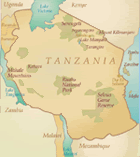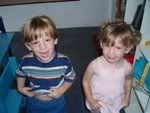 Rowan in her Obama kanga
Rowan in her Obama kanga
Friday was International Day at the International School of Tanganyika - meaning that kids were to come to school dressed in their “national costume”, participate in a parade of nations (by nationality), sing songs about peace and multiculturalism in an assembly, and attend the International Festival where kids were to talk around to different areas of the football field visiting different countries to learn something new, taste a bit of their food, and get their special “passports” stamped.
I’m normally horribly cynical about this sort of thing – but since the election last year this has largely changed. I was happy to dress in red, white, and blue and march in the parade with my kids – who like a huge chunk of the American contingent were decked out in Barack Obama t-shirts. Rowan even wore a specially made Obama dress for the occasion. For me, walking with the Obama
ians, and a scattering of cowboys and cowgirls (and even one Native American) was a joyful experience.
It was a reminder of just how multicultural this environment really is. Personally, I was shocked with the relatively small size of the American marchers. I expected them to take up a disproportionate portion of the crowd, but really they weren’t much bigger than then South Africans or the British, and may have even been smaller than the Indian contingent (which were of course the most beautifully dressed of the lot).
Inside the assembly, kids from South Asia, Japan and Kenya performed for the audience in between courses of Give Peace a Chance and a song called In This World Together (a poem, of sorts, about living in peace and protecting the earth). The Principal reminded the kids and gathered parents that many kids had a choice to make about which country they wanted to represent in the parade. Some kids marched with the country they were born in, some where their passport is from, some were they lived the longest, and some marched in the country of one parent, but not the other. And those that couldn’t decide marched with the “UN” contingent which also included “orphans” from countries where there were only one or two representatives like Luxemburg or Nepal.
And since I’m so sappy, I fell for the beautiful One World image:
Living together in peace
Protecting the earth
Fighting against poverty and injustice
And beautiful babies and chirping birds, la de da de da…I may have been so in the moment that I actually shed a tear of joy when the South Asian contingent of India, Pakistan and Sri Lanka pointed out that they made a conscientious decision to perform together – to show how people can live in peace.
It was only later that the downside of multiculturalism truly hit me in the face. At the festival part of International Day children were given a passport and told to visit booths from about 20 countries. In each booth the children could learn something about the country and get a treat or a small present somehow related to the country. I worked at the American booth as the passport stamper. In return for a tidbit about America (“Tell me something you know about America”) I stamped the kids’ passports and gave them a homemade chocolate chip cookie (made by little American Mommy elves and/or their cooks). It was mostly a happy task, except for the two older boys who claimed their chocolate chip cookies in exchange for information about how many people died on 9/11 when the planes hit the World Trade Towers – while wearing big smiles. That wasn’t such a nice moment. I’ve decided to blame it on their parents who must not be raising them under the banner of multiculturalism, rather than the kids themselves. At least that is what I needed to tell myself in order to get through the moment without taking them to task.
But overall it went great. Several hundred children from age 3 to 11 came by the American booth that day and I would say about 80% of them – no matter what their country of origin - told me that Barack Obama is the American President in exchange for their stamp and cookie. After awhile that got pretty boring so I started to challenge the American kids to tell me at least one other thing they knew about America.
Let me tell you, the answer is, not much. Well… one older kid impressed me with the knowledge that there were 13 states when America was first created and another told me that the bald eagle is our national bird. But then I looked up and realized that these tidbits were in the booth display behind them. I asked one 10-year-old American kid if he had ever heard of the Pilgrims. The silence was deafening.
My kids, they couldn’t do any better. When I asked them a few days before International Day what America meant to them Rowan responded that it meant Grandma’s house and the Good Humor Man. Jaden said Toys R Us and escalators. Barack Obama is what they know. Even the American flag is Barack Obama’s flag in their lexicon.
I take full credit for this failure. I should be supplementing the multiculturalism with some sort of identity-strengthening learning and I haven’t. Bad me. Now I’m wishing I could send the kids to an after-school American class where someone else could make up for my shortfalls (like having my Microsoft Word set to British English at work) with stories about the Mayflower and Jamestown. At least then they would know what American football is. (To-date they have no clue.) And perhaps they could help Rowan with her absolute obsession with wanting to be Indian (dot, not feather) which is primarily an obsession with wanting to wear colorful
saris and
salwar khamises. And perhaps the school could help get rid of the British
isms that have sneaked into their daily language, like saying
sitting room instead of
living room,
nappies instead of
diapers, and pronouncing
naughty like
noughty. These aren’t a big deal now, but if the experiences of my adult friends who grew up overseas are any indication, it will make them freaks when they get back to school in America. And depending on how old they are when we go back, it could be a traumatic experience.
Although we’ve been here for nearly four years, it is only now that it has really hit home that I am raising third culture kids. Or rather, intellectually I knew it was happening, but my work as a US immigration officer at International Day prompted me to internalize it.
And don’t get me wrong, this is NOT a bad thing. There are some many wonderful things about multiculturalism (see above). But it isn’t all roses and cream either.
According to the bible of third culture kids:
Third Culture Kids: The Experience of Growing Up Among Worlds by David C. Pollock and Ruth E. Van Reken,
“A Third Culture Kid (TCK) is a person who has spent a significant part of his or her developmental years outside the parents’ culture. The TCK builds relationships to all of the cultures, while not having full ownership of any. Although elements from each culture are assimilated into the TCK’s life experiences, the sense of belonging is in relationship to others of similar background.
“Two realities arch over TCK experience that shape their lives. These are:
1. Being raised in a genuinely cross-cultural world.
2. Being raised in a highly mobile world
“Other characteristics in common:
Distinct differences. Many TCKs are raised where being physically different from those around them is a major aspect of their identity.
Expected repatriation. Unlike immigrants, third culture families usually expect at some point to return permanently to live in their home country.
Privileged lifestyle. Historically TCKs are members of an elitist community – one with special privileges bestowed on its members.
System identity. Members of specific third culture communities may be more directly conscious than peers at home of representing something greater than themselves.
This definition very accurately reflects the realities are our lives now – with all the wonderful exposures they offer us, and all the losses of friends and cultural fluency ahead of us.
I love it and hate it, all at the same time. I still wouldn’t trade this experience for all the acculturation in the world. I hope that Jaden and Rowan will agree when they are old enough to realize what they’ve gained and what they may have lost.
Meanwhile, I’m trolling amazon.com for children’s books about the Pilgrims and George Washington. I want them to be people of the world. But they are also Americans and I need to make sure they are proud of that, too.
 The local watermelons actually make great jack-o-lanterns – and are much easier for kids to carve than pumpkins. And like Jaden, you can eat as you carve.
The local watermelons actually make great jack-o-lanterns – and are much easier for kids to carve than pumpkins. And like Jaden, you can eat as you carve. Neither of my kids had much luck with the pinata.
Neither of my kids had much luck with the pinata. Actually... with these vampire teeth maybe I won't have to spend a fortune on braces for Rowan after all.
Actually... with these vampire teeth maybe I won't have to spend a fortune on braces for Rowan after all. Jaden and Rowan in front of our banda with our watermelon.
Jaden and Rowan in front of our banda with our watermelon. I am impressed with the all-out effort some families put into their bandas – and wonder why I am somehow missing the Halloween décor spirit? Was it something that happened to me as a child?
I am impressed with the all-out effort some families put into their bandas – and wonder why I am somehow missing the Halloween décor spirit? Was it something that happened to me as a child? Jaden is just taking it all in...
Jaden is just taking it all in... The spirit of Michael Jackson joined us at the beach, too.
The spirit of Michael Jackson joined us at the beach, too. Zombies drinking.
Zombies drinking. Lots of classic candy you can’t find in Tanzania. Good job to the parents to planned ahead!
Lots of classic candy you can’t find in Tanzania. Good job to the parents to planned ahead! I was worried the trees would catch fire. But I’m a worry wart and a party pooper. So there!
I was worried the trees would catch fire. But I’m a worry wart and a party pooper. So there! (And isn’t it amazing you can get marshmallows at all!)
(And isn’t it amazing you can get marshmallows at all!)












 Jaden and Rowan
Jaden and Rowan






